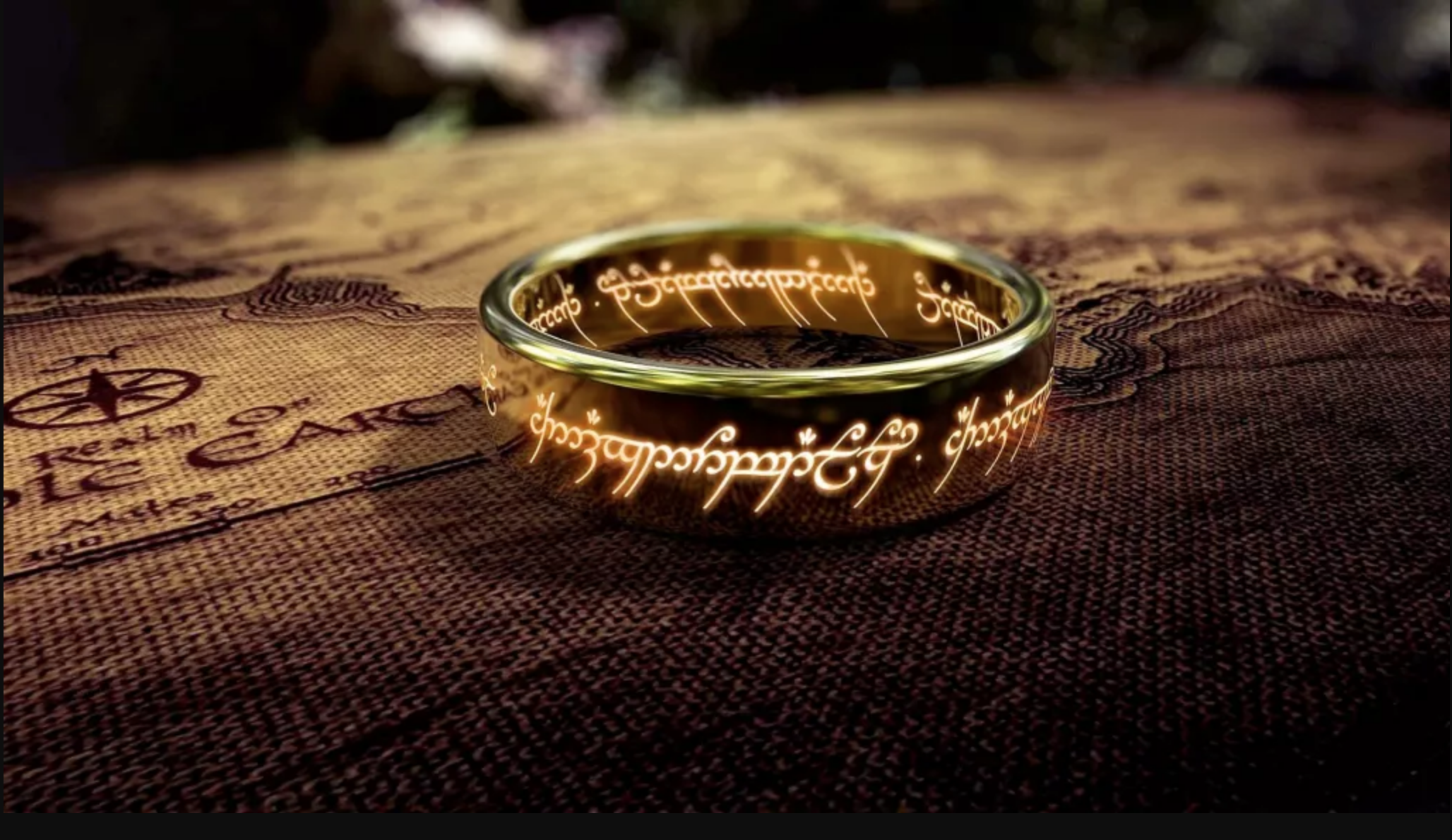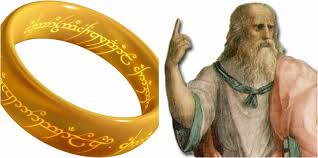Written by Justin D. Lyons, Contributing Writer, Classical Wisdom
“It seemed that the ring he had was a magic ring: it made you invisible! He had heard of such things, of course, in old, old tales; but it was hard to believe that he had really found one by accident.”The Hobbit by J.R.R. Tolkien
When Bilbo finds the Ring in the darkness of the goblin tunnels beneath the Misty Mountains after having lost his dwarves, his wizard and his way, he unwittingly picks up a powerful artifact and a theme of ancient origin.
Magic rings do appear in old tales—some of them in mythology from which Tolkien clearly drew inspiration. In Norse mythology, there is the magic ring Andvaranaut, forged by the shape-shifting dwarf Andvari and Draupnir, which belonged to the god Odin. But neither of these bear much comparison to Tolkien’s Ring. Their powers are too materialistic, making and hoarding gold, rather than the more spiritual and far more dangerous power of dominating the wills of others.
The ring story that may bear the closest resemblance to Tolkien’s is of more ancient origin: the tale of Gyges, which occurs in Book II of Plato’s Republic. In it, Glaucon tells the story of Gyges’ ring, which depicts a man free from the necessity to be just, i.e., free from the fear of punishment. Such a man, he argues, would be foolish if he continued to act in a just manner when he could have anything he wants. The ring allows him to fulfill his desires because it can render its wearer invisible. It is the ability to pass unseen that provides the fulcrum for the examination of justice in Plato’s story.
The Gyges tale is later re-told by Cicero in his ethical treatise, De Officiis:
… Plato introduces the well-known story of Gyges, who, when the ground had caved away on account of heavy rains, passed down into the opening, and saw, as the story goes, a brazen horse with doors in his sides. Opening these doors, he saw a man of unusual size, with a gold ring on his finger, which drawing off, he put it on his own finger (he was a shepherd in the king’s service), and then repaired to the company of the shepherds. There, as often as he turned the part of the ring where the stone was set to the palm of his hand, he became invisible, yet himself saw everything; and was again visible when he restored the ring to its proper place. Then, availing himself of the advantage which the ring gave him, he committed adultery with the queen, and by her assistance killed the king his master, and removed by death those whom he thought in his way. Nor could anyone see him in connection with these crimes. By means of the ring he in a short time became king of Lydia.De Officiis, III.38
Thus we see that Gyges uses the ring to indulge and pursue his every unlawful desire. His character is fully revealed when his actions are released from constraint. Cicero is more pointed than Plato in drawing out the moral import of the question of invisibility:
“The meaning of this ring and of this example is as follows: If no one would ever know, if no one would ever suspect, when you performed some act for the sake of wealth, power, ascendency, lust, — if it would remain forever unknown to gods and men, would you do it?”De Officiis, III.39
Though it certainly does not exhaust the capabilities of Tolkien’s Ring of Power, the endowment of invisibility is the most prominent parallel between the two rings. In both cases, invisibility reveals character because it poses the question, as Cicero notes, of what you would do if there were no fear of punishment. Gollum possesses the Ring the longest of any character except Sauron, and we know to what ends he used it:
“No one would see him, no one would notice him, till he had his fingers on their throat.”
In the course of his dark wanderings, Gollum loses the Ring. Measuring the world by his own wicked actions (not without justification), he knew the consequence: it would be done unto him as he had done unto others:
“We shan’t ever be safe again, never, Gollum! One of the goblinses will put it on, and then no one will see him. He’ll be there but not seen. Not even our clever eyeses will notice him; and he’ll come creepsy and tricksy and catch us, Gollum, Gollum!”
Luckily for him, the Ring was picked up, not by goblins, but by “the most unlikely person imaginable: Bilbo from the Shire!” When presented with the same opportunity to slay without danger, Bilbo makes a different choice.
“He was desperate. He must get away, out of this horrible darkness, while he had any strength left. He must fight. He must stab the foul thing, put its eyes out, kill it. It meant to kill him. No, not a fair fight. He was invisible now. Gollum had no sword.”
What is more, even in his fear, Bilbo feels sympathy:
“A sudden understanding, a pity mixed with horror, welled up in Bilbo’s heart: a glimpse of endless unmarked days without light or hope of betterment, hard stone, cold fish, sneaking and whispering.”
Bilbo’s subsequent actions with the Ring bear out this initial revelation of character. He uses the power of invisibility to save the dwarves in Mirkwood, to deliver them from the dungeons of the Elf king, and to spy out the dragon Smaug’s lair. (He does “steal” a cup, but its ownership is disputed).
He even takes special care that no one (spiders don’t count) be injured by his activities while invisible, putting the keys back on belt of chief guard so that he will not be blamed for the dwarves’ escape, and giving a gift to the elf king in return for his “hospitality”—the food and drink Bilbo had invisibly purloined. After he returns from his adventure, he uses the Ring for nothing more nefarious than avoiding unpleasant relatives.
The Gyges story in Plato and Cicero is a version of an older tale which occurs in The Histories by Herodotus, which is itself reflective of popular legend. But there is no magic ring in Herodotus’ telling. Gyges commits all the crimes of the later versions, but he is invisible only in that he is hidden from view and murders the defenseless king while he sleeps. Yet this difference serves to bring the point home.
We may not have a magic ring that would enable us to seize kingdoms or rule Middle-earth, but we face moral choices every day in small things. When we have the opportunity to do as we wish regardless of others, how do we choose? It is an ancient question—and one well worth asking ourselves.













5 comments
Of course, Tolkien had a classical education, like most educated men of his era. Norse mythology was his special love, but I think he probably could read Latin and Ancient Greek, and if not there are always translations. Therefore, it makes sense that his novel mythology might also be influenced by the Greeks and Romans.
Never been a Tolkien fan. Socrates was a brilliant but insufferable bore just Saul before the road to Damascus. Most of this may be explained in a form of projection of his perceived mastery and intellectual supremacy over others. It is not surprising he was made to take Hemlock. It is surprising this was not done much sooner.
Good post
Or is it that this is so intrinsic in the human mind, that no influence is required at all. Maybe its something that we all wish to be able to do, be invisible to others when we want, influence them to do what we want. Who didn’t ever think about it?
Of course its a question of character what you actually would do with this abilities.
Great article and interesting parallels. Men of Tolkien’s era had a relatively strong Classical education in grade school, unlike a typical non-existing one today (sadly), so it makes sense that Tolkien would draw from the writings of Antiquity. I’m sure Tolkien had a strong influence from local Norse, Celtic, & Germanic mythology, too.
Our apologies, you must be logged in to post a comment.